MOVIES
Švýcarsko, 2013, 48 min
Hans-Jurg Pffaf
24.01.2014 18:35
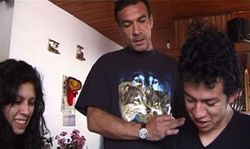 After having worked for 18 years in the U.S., the „sans-papier“ Richar returns to his country Ecuador with his new American wife. Although divorced from his former wife, he is still very attached to his three children.
After having worked for 18 years in the U.S., the „sans-papier“ Richar returns to his country Ecuador with his new American wife. Although divorced from his former wife, he is still very attached to his three children.
The reunion with the family and with old friends shows in a personal way the tensions as well as the hopes and the courage to face the difficult reality of a migrant. The filmmaker, to whom Richar is linked by a friendship since an anthropological field reasearch 30 years ago, follows him during the first weeks of his return to his village in the Andes.
Hans-Jurg is born in Zurich, Switzerland. He studied cultural Anthropology in Zurich and Ecuador where he met the main character of the movie. He has made various documentaries.
Dialogues: Spanish, English, subtitles: English, Czech
Production: Prodok film, Zurich
Director, camera: Hans-Jurg Pffaf
Velká Británie, 2013, 20 min
Elise Laker
25.01.2014 17:45
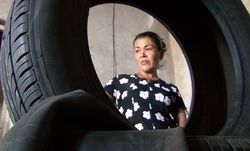 Every year, hundreds of thousands of migrant workers leave Tajikistan in search of employment. The money sent back provides a huge boost to the economy; in fact, Tajikistan is the most remittance-dependent country in the world. The vast majority of these migrants are male, which means the Tajik population is becoming ever-more female. So what happens to the women who are left behind?
Every year, hundreds of thousands of migrant workers leave Tajikistan in search of employment. The money sent back provides a huge boost to the economy; in fact, Tajikistan is the most remittance-dependent country in the world. The vast majority of these migrants are male, which means the Tajik population is becoming ever-more female. So what happens to the women who are left behind?
Behind the Wheel serves as an inquiry into the moral and emotional turmoil of Nigora, an Uzbek woman whose traditional life of being a housewife is interrupted after her migrant husband fails to send back enough money and she finds out he has been having an affair. No longer able to rely on her husband, Nigora defies prevailing gender norms and sets to work fixing car tyres.
Elise is a recent graduate of the Granada Centre for Visual Anthropology, where she received training in observational filmmaking. Alongside her MA, she hold a BA in French and Russian from University of Nottingham. Elise has travelled extensively throughout Central Asia and has a fascination with post-Soviet countries.
Production: The Granada Center for Visual Anthropology, University of Mancherster, UK
Director, camera: Elise Laker
Dialogues: Uzbeck, subtitles: English, Czech
Česká republika, 2013, 28 min
Ladislav Švec
25.01.2014 15:50
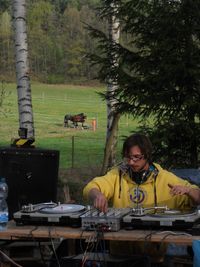 Original purpose of this film was like an attachment to bachelor´s work focused on freetekno subculture and phenomenon of freeparty in the context of Czech Republic area. The main goal is exposed an emic point of view on freeparty to the readers and specatators. The other aim is attempt to explain a certain schism in freetekno czech scene which is caused by influence of economic tendency on the culture industry. There is a connection with desintegration of ideas based on popularization (became popular among the masses), relaxation and last but not least self-realization.
Original purpose of this film was like an attachment to bachelor´s work focused on freetekno subculture and phenomenon of freeparty in the context of Czech Republic area. The main goal is exposed an emic point of view on freeparty to the readers and specatators. The other aim is attempt to explain a certain schism in freetekno czech scene which is caused by influence of economic tendency on the culture industry. There is a connection with desintegration of ideas based on popularization (became popular among the masses), relaxation and last but not least self-realization.
This film is first project of talented anthropologist, who approached to visual anthropology at his „alma mater“ University of Pardubice. At the same university he is now attending master program.
Dialogues: Czech
Production: University of Pardubice, CZ
Director, camera, edit: Ladislav Švec
Srbsko, 2013, 12 min
K. Milutinović, I. Begani, L. Milenković
25.01.2014 15:35
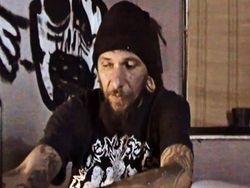 Film Gricko is about a man who who transforms his ideas into actions at one place. At certain moment he is moving from one place to another, from Skopje to Belgrade, into Inex Film. Transfering his activist’s ideas he is giving new spirit to place and way of functioning of Inex Film. He became the link that connected the different points of view in a synchronous whole.
Film Gricko is about a man who who transforms his ideas into actions at one place. At certain moment he is moving from one place to another, from Skopje to Belgrade, into Inex Film. Transfering his activist’s ideas he is giving new spirit to place and way of functioning of Inex Film. He became the link that connected the different points of view in a synchronous whole.
Katarina Milutinovic, Ivan Begani and Luka Milenkovic are studying ethnology and anthropology at the University of Belgrade. In addition to individual small works and researches within the faculty, they have applied for project of visual anthropology, which brought them their first contact with camera, and also opened them new horizons in terms of research.
dialogues: Serbian, subtitles: English, Czech
Produkce: Klub Studenata Etnologije i Antropologije, Bělehrad, Srbsko
Directors, camera: K. Milutinović, I. Begani, L. Milenković
Kolumbie, 2013, 22 min
Simon Rasing
24.01.2014 19:50
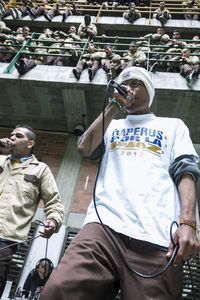 Can rap be a way out of the prison?
Can rap be a way out of the prison?
Hip Hop is often associated with drugs and violence and therefore seen by many as a way into prison, but Alma Negra, DJ Roky and New York, three inmates at Distrial prison in Bogota, Colombia, demonstrate the opposite. For two hours a day they are allowed to leave the courtyard to write and practice their music. Rap enables them to protest and share their experiences in life. This film tells their story and the impact Hip Hop has on them.
Simon is an ethnographic researcher and filmmaker from Utrecht, Netherlands. He attained an MA in Visual Anthropology from the Granada Centre, University of Mancester and BA in Cultural Anthropology from teh University of Utrecht. During his MA degree he has made two documentary. The latter was an ethnographic film project carried out over the summer and autumn in Bogota, Colombia.
dialogues: Spanish, subtitles: English, Czech
Production, director, camera: Simon Rasing
THE WORLD PREMIERE!
Česká republika, 2013, 10 min
P. Ďurinová, P. Burzová, J. Majer
25.01.2014 15:25
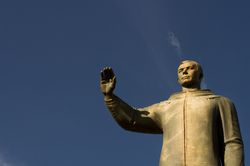 Stone Guests is an ethnographic micro-study based on 15 interviews with inhabitants and visitors of Karlovy Vary as well as city representatives and historians. Our goal was to identify changing attitudes to the symbols of socialist past in a city with significant Russian presence. We were interested in emic explanations regarding the changing symbolic and material landscapes of Karlovy Vary. At the level of city administration, this film offers an example of post-socialist selection of appropriate (post-)political symbols.
Stone Guests is an ethnographic micro-study based on 15 interviews with inhabitants and visitors of Karlovy Vary as well as city representatives and historians. Our goal was to identify changing attitudes to the symbols of socialist past in a city with significant Russian presence. We were interested in emic explanations regarding the changing symbolic and material landscapes of Karlovy Vary. At the level of city administration, this film offers an example of post-socialist selection of appropriate (post-)political symbols.
This film was produced during Summer School of Ethnographic Filmmaking in Žlutice.
Paula Ďurinová is Slovak documentarist based in Bratislava, she has directed several documentary films and founded the Living documentary association. Petra L. Burzová is a member of Centre for Visual Ethnography and has been focusing on research in political science and cultural anthropology. Jiří Majer is anthropologist concentrating on the discourses of mental disorders. He has been doing his field research in Indonesia.
dialogues: Czech, Russian, subtitles: english
production: Studio vizuální etnografie SVIET, katedra antropologie, FF ZČU
directors, cameras: P. Ďurinová, P. Burzová, J. Majer
Indonésie, 2012, 65 min
J.de Séve, K.Tjong
25.01.2014 14:00
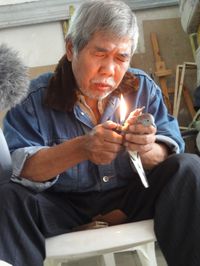 Two filmmakers dive into an ancient rite of manhood in Islamic Java – the tender and raucous sport of the singing doves, the Indonesian Nascar. When General Zainuri announces The National Perkutut Championship, thousands of Muslim men arrive at the grounds. Seven hundred poles stand in the center. Men hoist their doves – perkutut – seven meters up and dangle them ina sea of colorful cages.
Two filmmakers dive into an ancient rite of manhood in Islamic Java – the tender and raucous sport of the singing doves, the Indonesian Nascar. When General Zainuri announces The National Perkutut Championship, thousands of Muslim men arrive at the grounds. Seven hundred poles stand in the center. Men hoist their doves – perkutut – seven meters up and dangle them ina sea of colorful cages.
A team of judges passes trought the forest of tall posts straining to discern the birds magical coos. If the judges are impressed they score a bird´s dong by tacking a small flag to the pole. After three hours a winner is declared. Winning perkutut sell for tens of milion rupiahs – tens of thousands of dollars.
Jim de Séve teches film production at Union College in Schenectady. Prior to that, he was an instructor at Film Video Arts in NYC for ten year. He sists at the board of Media Alliance, a non-for-profit who operates a sanctuary for independent media.
Kian Tjong was born and raised in Indonesia and he has lived in the US since 1997 when he came as a Fujitsu MBA scholar at the University of Hawaii and Japan-America Institute of Management Science.
Dialogues: Indonesian, subtitles: English, Czech
production, directors, camera: Jim de Séve a Kian Tjong
Launching (selection):
Taiwan Intenational Ethnographic Film Festival, 2013
Royal Anthropological Institute Film Festival, Edinburg, 2013
Festival International du Film Ethnographique du Québec, 2013
Moscow International Festival of Visual Anthropology, 2012
Kazan Festival of Muslim Cinema, 2012
Norsko, 2013, 41 min
Konrad Pilot
25.01.2014 21:05
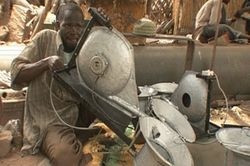 At the blacksmith market in Maroua, in the Far North region of Cameroon the hammers clang all day long. Here the local blacksmiths turn scrap iron into objects for everyday use. Car bodies become wheelbarrows, truck wheels are transformed into ploughs and smaller pieces of scrap iron end up as spoons. The film is a portrait of Abakar, a young creative blacksmith pursuing his dream to medernize his workshop and to established a blacksmith enterprise. Following Abakar at the work at his workshop, at home with his family, at the meetings and exhibitions movie presents a persistent struggle of an individual to fulfill his dreams of successful enterpreneurship, by bringing seemingly unusable pieces of iron back to life.
At the blacksmith market in Maroua, in the Far North region of Cameroon the hammers clang all day long. Here the local blacksmiths turn scrap iron into objects for everyday use. Car bodies become wheelbarrows, truck wheels are transformed into ploughs and smaller pieces of scrap iron end up as spoons. The film is a portrait of Abakar, a young creative blacksmith pursuing his dream to medernize his workshop and to established a blacksmith enterprise. Following Abakar at the work at his workshop, at home with his family, at the meetings and exhibitions movie presents a persistent struggle of an individual to fulfill his dreams of successful enterpreneurship, by bringing seemingly unusable pieces of iron back to life.
Konrad Pilot was born in Poland. He studied Social Anthropology with Philosophy and religion Studies as minors at the LMU in Munich, Germany and Visual Cultural Studies in Tromsø, Norway. Noise That Brings Money is his first film.
Dialogues: French, Fulfulde, subtitles: English, Czech
Production: Visuelle kulturstudier, University of Tromso, Norway
Director, camera: Konrad Pilot
THE WORLD PREMIERE!
Velká Británie, 2013, 25 min
Sophie Wagner
25.01.2014 20:10
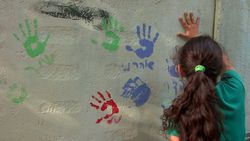 On a small hill in the north of Israel the members of a religious kibbutz, a community of artists and an Arab village – who share a politically fraught history including losing homes and reclaming identity – live as neighbours in a hillside. Although villagers of the three communities do not hold many narratives in common, they do share an understanding of the power od mastering them. The way in which each story, and they are often conflicting ones of victim-hood and guilt, pride and wrongdoings, contains the other without neccessarily relating to it, laid bare a sense of unavoidable inter-subjectivity- This film is an attempt to communicate alternative points of views to the often quite stereotypical imagery we, in central Europe, are bound to perceive via dramatic media reports on the situation in Israel. We follow people´s lives in a shared enviroment and begin to understand, that individual identifications to rarely match up with official categories, which are deployed by state sponsored narratives. The governing of those is a powerful tool – therefore the creation of contemporary, shared, narratives of land and people is a politically meaningful act. On Common Ground points to the question if, and how, this can have an effect in a country that is divided within and under constant pressure from the outside.
On a small hill in the north of Israel the members of a religious kibbutz, a community of artists and an Arab village – who share a politically fraught history including losing homes and reclaming identity – live as neighbours in a hillside. Although villagers of the three communities do not hold many narratives in common, they do share an understanding of the power od mastering them. The way in which each story, and they are often conflicting ones of victim-hood and guilt, pride and wrongdoings, contains the other without neccessarily relating to it, laid bare a sense of unavoidable inter-subjectivity- This film is an attempt to communicate alternative points of views to the often quite stereotypical imagery we, in central Europe, are bound to perceive via dramatic media reports on the situation in Israel. We follow people´s lives in a shared enviroment and begin to understand, that individual identifications to rarely match up with official categories, which are deployed by state sponsored narratives. The governing of those is a powerful tool – therefore the creation of contemporary, shared, narratives of land and people is a politically meaningful act. On Common Ground points to the question if, and how, this can have an effect in a country that is divided within and under constant pressure from the outside.
Sophie Wagner graduated from cultural and social anthropology at the University od Vienna. Now, she is currently finishing her second MA in the Centre of Visual Anthropology at the University of Manchester. She is also working for the Ethnocineca – Vienna´s documentary and ethnographic film fest.
Dialogues: English, Hebrew, Subtitles: English, Czech
Production, director, camera: Sophie Wagner
THE WORLD PREMIERE!
Norsko, 2013, 9 min
Martin Gruber
25.01.2014 19:40
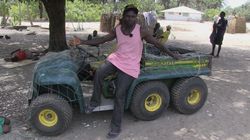 A small village on the coast of Guinea, West Africa. Missionaries settled here in their effort to bring Christianity to this Muslim dominated area. The villagers still speak warmly about their visitors. Nevertheless, the missionaries left after some years – seemingly in a rush, leaving behind many of their belongings. The film “Our Missionaries” tells the story of a misconceived intercultural encounter using the villagers’ memories and images of the missionaries’ material legacy.
A small village on the coast of Guinea, West Africa. Missionaries settled here in their effort to bring Christianity to this Muslim dominated area. The villagers still speak warmly about their visitors. Nevertheless, the missionaries left after some years – seemingly in a rush, leaving behind many of their belongings. The film “Our Missionaries” tells the story of a misconceived intercultural encounter using the villagers’ memories and images of the missionaries’ material legacy.
Martin Gruber studied Visual Anthropology at Goldsmiths College, London and Social Anthropology at Hamburg University. He works as an ethnographic researcher and filmmaker and teaches visual anthropology. Martin recently completed a PhD on participatory ethnographic filmmaking at the Department of Anthropology and Cultural Studies, University of Bremen.
Production, director, camera: Martin Gruber
dialogues: Nalu language
subtitles: English, Czech
Launching:
NAFA Film Festival, Bilbao, 2013
Ethnological Film Festival Kratovo, Macedonia, 2013
Athens Ethnographic Film Festival 2013
Švýcarsko, 2013, 66 min
Ramona Sonderegger
25.01.2014 18:05
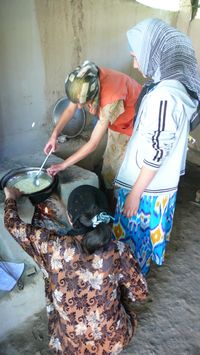 The Kyrgyz Organisation CBT (Kyrgyz Community Based Tourism Association) made an advertisement in an alpine newspaper with the help of a Swiss Tourist. They were looking for a cheese maker to teach interested women in a mountain region village in Arslanbob about cheese making. Maike Oestreich, a cheese maker and farmer based in Switzerland decided to spend her summer in the Kyrgyz mountains for once rather than on an alp in Switzerland. She has never crossed the borders of Europe before.
The Kyrgyz Organisation CBT (Kyrgyz Community Based Tourism Association) made an advertisement in an alpine newspaper with the help of a Swiss Tourist. They were looking for a cheese maker to teach interested women in a mountain region village in Arslanbob about cheese making. Maike Oestreich, a cheese maker and farmer based in Switzerland decided to spend her summer in the Kyrgyz mountains for once rather than on an alp in Switzerland. She has never crossed the borders of Europe before.
The movie shows, how this specific knowledge is transferred and transformed in a completely different context and what kind of problems arise, when different actors with theirs different intentions are involved in a kind of voluntary development aid project.
The filmmaker was following the cheese maker from her working place in the alpine dairy in Sufers in Switzerland to the world’s largest walnut forest in Arslanbob to accompany and observe her ongoing project.
Ramona Helena Sonderegger is Primary teacher and has BA in Social Anthropology, Psychology and Political Sciences at the University of Zurich.
production, director, camera: Ramona Helena Sonderegger
Dialogues: English, Deutch, Uzbec
Subtitles: English, Czech
Norsko, 2013, 28 min
Tanel Saimre
24.01.2014 20:55
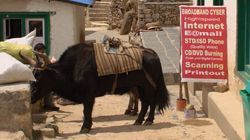 Internet and telecommunications have penetrated the world to a degree of not even being amazing any longer. We take the ability to connect to people and machines on the other side of the planet for granted. How does this technology adapt to a mountain village in Nepal, and how does the mountain village adapt itself to it?
Internet and telecommunications have penetrated the world to a degree of not even being amazing any longer. We take the ability to connect to people and machines on the other side of the planet for granted. How does this technology adapt to a mountain village in Nepal, and how does the mountain village adapt itself to it?
„The High Cybercafe“ depicts the life of two young Nepalis working in a cybercafe in Namche Bazaar, on the trail to Mount Everest. We see their working day and take a side trip to the computer lesson at the local elementary school. We witness the change as it happens.
Tanel Saimre is an Estonian researcher trained in Archaeology (MA from Tartu University, Estonia) and Visual Anthropology (M Phil, Tromsø University, Norway). He is interested in the technological aspect of human existence. He has worked on positions relating to archaeology, filmmaking, software development and many others.
production, director, camera: Tanel Saimre
dialogues: English, Nepali
subtitles: English, Czech
Launching:
NAFA International Film Festival, Tromso
Anthropological Film Festival 2012 in Ho Chi Minh City, Vietnam
Worldfilm 2013 in Tartu, Estonia
Norsko, 2013, 41 min
Lamtur Tanlaka Kilian
24.01.2014 21:50
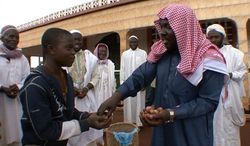 „Together as one“ shows the social use of kola nut in Nso´ society. Nso´ is an ethnic group in the North West region of Cameroon. The Nso´ population counts Christians, Muslims and followers of traditional religious beliefs.
„Together as one“ shows the social use of kola nut in Nso´ society. Nso´ is an ethnic group in the North West region of Cameroon. The Nso´ population counts Christians, Muslims and followers of traditional religious beliefs.
This film shows what a thing, a nut or a natural resource can mean to people in Nso´ society. Kola nut is an item around which the feeling, experience, sense, and lived „reality“ of belonging, togetherness, being together, unity, oneness, friendship and peace is being expressed. The kola nut thus play an important role in bringing very diverse people together, irrespective of their religion, village, quater, or thoughts. In this sense, kola nut brings about a feeling of togetherness, felowship and belonging to a group.
Lamtur Tanlaka Kilian from Cameroon has diploma from History from the University of Ngoundere in Cameroon and Master in Visual Cultural Studies from teh University of Tromsø , Norway.
Dialogues: Lamnsko language, subtitles: English, Czech
Production: Visuelle kulturstudier, University of Tromso, Norsko
Director, camera: Lamtur Tanlaka Kilian
AWARD of the XXII International Festival of Ethnological Films in Belgrade, Serbia, 2013
Rakousko, 2013, 29 min
Martin Zinggl
24.01.2014 20:10
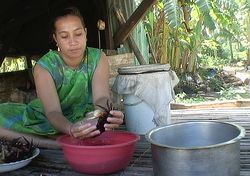 Toku Fenua takes us on an extraordinary journey into the South Pacific and offers a glimpse of life on the remote island of Niulakita in Tuvalu. Niulakita is the smallest, most isolated inhabited island in the world with only 47 Tuvaluans living on 0,4 square kilometres. The director spent several month in this island doing an anthropological fieldwork. Toku Fenua lets us closely participate in the daily routines of three islanders; their dreams and concerns. It also shows the problems that people in such a harsh enviroment are exposed to.
Toku Fenua takes us on an extraordinary journey into the South Pacific and offers a glimpse of life on the remote island of Niulakita in Tuvalu. Niulakita is the smallest, most isolated inhabited island in the world with only 47 Tuvaluans living on 0,4 square kilometres. The director spent several month in this island doing an anthropological fieldwork. Toku Fenua lets us closely participate in the daily routines of three islanders; their dreams and concerns. It also shows the problems that people in such a harsh enviroment are exposed to.
Martin Zinggl, born in Vienna, studied social and cultural anthropology and journalism. He resides as an author and film maker in Vianna and Barcelona and he is currently working in the publication of his first non-scientific book about Tuvalu.
Production, director, camera: Martin Zinggl
Dialogues: Tuvalian, English
Subtitles: English, Czech
Launching (selection):
10th Eyes and Lenses, Warsaw, 2013
Ethnocineca 2013, Vienna
Pacific Islands Festival 2013, Basel
Česká republika, 2013, 28 min
Vladimír Turner
25.01.2014 17:00
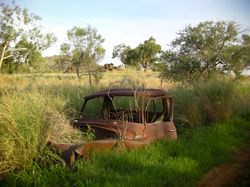 The film is poetic portrayal of a young woman who, eager to be an active citizen, is trying to come to terms with a complicated history of the continent. Alana Hunt is a curator in Aboriginal community art center. White employees work with Aboriginal artists who tell the history of the Aboriginal nation Giya throught art. Alana tries to help others in all possible ways which makes her more of a social worker and a close friend of the local people. The complicated postcolonial situation in Australia forces her to the question the client-based approach ant the actual contribution of the white people to the Aboriginal community.
The film is poetic portrayal of a young woman who, eager to be an active citizen, is trying to come to terms with a complicated history of the continent. Alana Hunt is a curator in Aboriginal community art center. White employees work with Aboriginal artists who tell the history of the Aboriginal nation Giya throught art. Alana tries to help others in all possible ways which makes her more of a social worker and a close friend of the local people. The complicated postcolonial situation in Australia forces her to the question the client-based approach ant the actual contribution of the white people to the Aboriginal community.
Vladimír Turner graduated from Audiovisual Studies on Film and Television Faculty in Prague and Intermedial communication on Academy of Arts, Architecture and Design in Prague. He attended study in Buenos Aires, Valencia and Australia. He oscillates between documentary, art in public space and activism. You can see his works from all over the world on the streets, screens and galeries.
dialogues: English, subtitles: Czech
Production, director, camera: Vladimír Turner
Česká republika, 2013, 6 min
Š. Kadlecová, L.Lipták, P.Bouška
25.01.2014 15:15
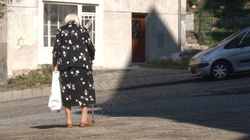 The Yellow House is an ethnographic micro-study exploring demographic changes in Žlutice, a town in former Sudetenland region, in 20th Century. The movie narrates a story of a house which facade is labeled by the David´s Star. Through symbols of the past and images of the present reveals individual history of the inhabitants of the house. The movie was produced during Summer School of Ethnographic filmmaking organized by Department of Anthropology at the University of West Bohemia.
The Yellow House is an ethnographic micro-study exploring demographic changes in Žlutice, a town in former Sudetenland region, in 20th Century. The movie narrates a story of a house which facade is labeled by the David´s Star. Through symbols of the past and images of the present reveals individual history of the inhabitants of the house. The movie was produced during Summer School of Ethnographic filmmaking organized by Department of Anthropology at the University of West Bohemia.
Petr Bouška is PhD candidate in the Department of Political Science at the University of West Bohemia in Pilsen. His main aim in reaserch is Czechoslovak cinematography. He works as radio host.
Šárka Kadlecová works for Language Center of Faculty of Arts of the Charles University and in the NGO sector. She creates educational tools to prevent prejudice, racism and hate violence.
Lubomír Lipták lectures in the Department of Political Science and International Relations at the University of West Bohemia and as well in the Department of Anthropology at the same university.His work is focused on security discurs of the Slovak Republic, patrimonial stuctures of post-communist state and construction of colective identities.
 After having worked for 18 years in the U.S., the „sans-papier“ Richar returns to his country Ecuador with his new American wife. Although divorced from his former wife, he is still very attached to his three children.
After having worked for 18 years in the U.S., the „sans-papier“ Richar returns to his country Ecuador with his new American wife. Although divorced from his former wife, he is still very attached to his three children. 
 Every year, hundreds of thousands of migrant workers leave Tajikistan in search of employment. The money sent back provides a huge boost to the economy; in fact, Tajikistan is the most remittance-dependent country in the world. The vast majority of these migrants are male, which means the Tajik population is becoming ever-more female. So what happens to the women who are left behind?
Every year, hundreds of thousands of migrant workers leave Tajikistan in search of employment. The money sent back provides a huge boost to the economy; in fact, Tajikistan is the most remittance-dependent country in the world. The vast majority of these migrants are male, which means the Tajik population is becoming ever-more female. So what happens to the women who are left behind?  Original purpose of this film was like an attachment to bachelor´s work focused on freetekno subculture and phenomenon of freeparty in the context of Czech Republic area. The main goal is exposed an emic point of view on freeparty to the readers and specatators. The other aim is attempt to explain a certain schism in freetekno czech scene which is caused by influence of economic tendency on the culture industry. There is a connection with desintegration of ideas based on popularization (became popular among the masses), relaxation and last but not least self-realization.
Original purpose of this film was like an attachment to bachelor´s work focused on freetekno subculture and phenomenon of freeparty in the context of Czech Republic area. The main goal is exposed an emic point of view on freeparty to the readers and specatators. The other aim is attempt to explain a certain schism in freetekno czech scene which is caused by influence of economic tendency on the culture industry. There is a connection with desintegration of ideas based on popularization (became popular among the masses), relaxation and last but not least self-realization. Film Gricko is about a man who who transforms his ideas into actions at one place. At certain moment he is moving from one place to another, from Skopje to Belgrade, into Inex Film. Transfering his activist’s ideas he is giving new spirit to place and way of functioning of Inex Film. He became the link that connected the different points of view in a synchronous whole.
Film Gricko is about a man who who transforms his ideas into actions at one place. At certain moment he is moving from one place to another, from Skopje to Belgrade, into Inex Film. Transfering his activist’s ideas he is giving new spirit to place and way of functioning of Inex Film. He became the link that connected the different points of view in a synchronous whole. Can rap be a way out of the prison?
Can rap be a way out of the prison?  Stone Guests is an ethnographic micro-study based on 15 interviews with inhabitants and visitors of Karlovy Vary as well as city representatives and historians. Our goal was to identify changing attitudes to the symbols of socialist past in a city with significant Russian presence. We were interested in emic explanations regarding the changing symbolic and material landscapes of Karlovy Vary. At the level of city administration, this film offers an example of post-socialist selection of appropriate (post-)political symbols.
Stone Guests is an ethnographic micro-study based on 15 interviews with inhabitants and visitors of Karlovy Vary as well as city representatives and historians. Our goal was to identify changing attitudes to the symbols of socialist past in a city with significant Russian presence. We were interested in emic explanations regarding the changing symbolic and material landscapes of Karlovy Vary. At the level of city administration, this film offers an example of post-socialist selection of appropriate (post-)political symbols.  Two filmmakers dive into an ancient rite of manhood in Islamic Java – the tender and raucous sport of the singing doves, the Indonesian Nascar. When General Zainuri announces The National Perkutut Championship, thousands of Muslim men arrive at the grounds. Seven hundred poles stand in the center. Men hoist their doves – perkutut – seven meters up and dangle them ina sea of colorful cages.
Two filmmakers dive into an ancient rite of manhood in Islamic Java – the tender and raucous sport of the singing doves, the Indonesian Nascar. When General Zainuri announces The National Perkutut Championship, thousands of Muslim men arrive at the grounds. Seven hundred poles stand in the center. Men hoist their doves – perkutut – seven meters up and dangle them ina sea of colorful cages. At the blacksmith market in Maroua, in the Far North region of Cameroon the hammers clang all day long. Here the local blacksmiths turn scrap iron into objects for everyday use. Car bodies become wheelbarrows, truck wheels are transformed into ploughs and smaller pieces of scrap iron end up as spoons. The film is a portrait of Abakar, a young creative blacksmith pursuing his dream to medernize his workshop and to established a blacksmith enterprise. Following Abakar at the work at his workshop, at home with his family, at the meetings and exhibitions movie presents a persistent struggle of an individual to fulfill his dreams of successful enterpreneurship, by bringing seemingly unusable pieces of iron back to life.
At the blacksmith market in Maroua, in the Far North region of Cameroon the hammers clang all day long. Here the local blacksmiths turn scrap iron into objects for everyday use. Car bodies become wheelbarrows, truck wheels are transformed into ploughs and smaller pieces of scrap iron end up as spoons. The film is a portrait of Abakar, a young creative blacksmith pursuing his dream to medernize his workshop and to established a blacksmith enterprise. Following Abakar at the work at his workshop, at home with his family, at the meetings and exhibitions movie presents a persistent struggle of an individual to fulfill his dreams of successful enterpreneurship, by bringing seemingly unusable pieces of iron back to life. On a small hill in the north of Israel the members of a religious kibbutz, a community of artists and an Arab village – who share a politically fraught history including losing homes and reclaming identity – live as neighbours in a hillside. Although villagers of the three communities do not hold many narratives in common, they do share an understanding of the power od mastering them. The way in which each story, and they are often conflicting ones of victim-hood and guilt, pride and wrongdoings, contains the other without neccessarily relating to it, laid bare a sense of unavoidable inter-subjectivity- This film is an attempt to communicate alternative points of views to the often quite stereotypical imagery we, in central Europe, are bound to perceive via dramatic media reports on the situation in Israel. We follow people´s lives in a shared enviroment and begin to understand, that individual identifications to rarely match up with official categories, which are deployed by state sponsored narratives. The governing of those is a powerful tool – therefore the creation of contemporary, shared, narratives of land and people is a politically meaningful act. On Common Ground points to the question if, and how, this can have an effect in a country that is divided within and under constant pressure from the outside.
On a small hill in the north of Israel the members of a religious kibbutz, a community of artists and an Arab village – who share a politically fraught history including losing homes and reclaming identity – live as neighbours in a hillside. Although villagers of the three communities do not hold many narratives in common, they do share an understanding of the power od mastering them. The way in which each story, and they are often conflicting ones of victim-hood and guilt, pride and wrongdoings, contains the other without neccessarily relating to it, laid bare a sense of unavoidable inter-subjectivity- This film is an attempt to communicate alternative points of views to the often quite stereotypical imagery we, in central Europe, are bound to perceive via dramatic media reports on the situation in Israel. We follow people´s lives in a shared enviroment and begin to understand, that individual identifications to rarely match up with official categories, which are deployed by state sponsored narratives. The governing of those is a powerful tool – therefore the creation of contemporary, shared, narratives of land and people is a politically meaningful act. On Common Ground points to the question if, and how, this can have an effect in a country that is divided within and under constant pressure from the outside. A small village on the coast of Guinea, West Africa. Missionaries settled here in their effort to bring Christianity to this Muslim dominated area. The villagers still speak warmly about their visitors. Nevertheless, the missionaries left after some years – seemingly in a rush, leaving behind many of their belongings. The film “Our Missionaries” tells the story of a misconceived intercultural encounter using the villagers’ memories and images of the missionaries’ material legacy.
A small village on the coast of Guinea, West Africa. Missionaries settled here in their effort to bring Christianity to this Muslim dominated area. The villagers still speak warmly about their visitors. Nevertheless, the missionaries left after some years – seemingly in a rush, leaving behind many of their belongings. The film “Our Missionaries” tells the story of a misconceived intercultural encounter using the villagers’ memories and images of the missionaries’ material legacy.  The Kyrgyz Organisation CBT (Kyrgyz Community Based Tourism Association) made an advertisement in an alpine newspaper with the help of a Swiss Tourist. They were looking for a cheese maker to teach interested women in a mountain region village in Arslanbob about cheese making. Maike Oestreich, a cheese maker and farmer based in Switzerland decided to spend her summer in the Kyrgyz mountains for once rather than on an alp in Switzerland. She has never crossed the borders of Europe before.
The Kyrgyz Organisation CBT (Kyrgyz Community Based Tourism Association) made an advertisement in an alpine newspaper with the help of a Swiss Tourist. They were looking for a cheese maker to teach interested women in a mountain region village in Arslanbob about cheese making. Maike Oestreich, a cheese maker and farmer based in Switzerland decided to spend her summer in the Kyrgyz mountains for once rather than on an alp in Switzerland. She has never crossed the borders of Europe before. Internet and telecommunications have penetrated the world to a degree of not even being amazing any longer. We take the ability to connect to people and machines on the other side of the planet for granted. How does this technology adapt to a mountain village in Nepal, and how does the mountain village adapt itself to it?
Internet and telecommunications have penetrated the world to a degree of not even being amazing any longer. We take the ability to connect to people and machines on the other side of the planet for granted. How does this technology adapt to a mountain village in Nepal, and how does the mountain village adapt itself to it?  „Together as one“ shows the social use of kola nut in Nso´ society. Nso´ is an ethnic group in the North West region of Cameroon. The Nso´ population counts Christians, Muslims and followers of traditional religious beliefs.
„Together as one“ shows the social use of kola nut in Nso´ society. Nso´ is an ethnic group in the North West region of Cameroon. The Nso´ population counts Christians, Muslims and followers of traditional religious beliefs.  Toku Fenua takes us on an extraordinary journey into the South Pacific and offers a glimpse of life on the remote island of Niulakita in Tuvalu. Niulakita is the smallest, most isolated inhabited island in the world with only 47 Tuvaluans living on 0,4 square kilometres. The director spent several month in this island doing an anthropological fieldwork. Toku Fenua lets us closely participate in the daily routines of three islanders; their dreams and concerns. It also shows the problems that people in such a harsh enviroment are exposed to.
Toku Fenua takes us on an extraordinary journey into the South Pacific and offers a glimpse of life on the remote island of Niulakita in Tuvalu. Niulakita is the smallest, most isolated inhabited island in the world with only 47 Tuvaluans living on 0,4 square kilometres. The director spent several month in this island doing an anthropological fieldwork. Toku Fenua lets us closely participate in the daily routines of three islanders; their dreams and concerns. It also shows the problems that people in such a harsh enviroment are exposed to. The film is poetic portrayal of a young woman who, eager to be an active citizen, is trying to come to terms with a complicated history of the continent. Alana Hunt is a curator in Aboriginal community art center. White employees work with Aboriginal artists who tell the history of the Aboriginal nation Giya throught art. Alana tries to help others in all possible ways which makes her more of a social worker and a close friend of the local people. The complicated postcolonial situation in Australia forces her to the question the client-based approach ant the actual contribution of the white people to the Aboriginal community.
The film is poetic portrayal of a young woman who, eager to be an active citizen, is trying to come to terms with a complicated history of the continent. Alana Hunt is a curator in Aboriginal community art center. White employees work with Aboriginal artists who tell the history of the Aboriginal nation Giya throught art. Alana tries to help others in all possible ways which makes her more of a social worker and a close friend of the local people. The complicated postcolonial situation in Australia forces her to the question the client-based approach ant the actual contribution of the white people to the Aboriginal community. The Yellow House is an ethnographic micro-study exploring demographic changes in Žlutice, a town in former Sudetenland region, in 20th Century. The movie narrates a story of a house which facade is labeled by the David´s Star. Through symbols of the past and images of the present reveals individual history of the inhabitants of the house. The movie was produced during Summer School of Ethnographic filmmaking organized by Department of Anthropology at the University of West Bohemia.
The Yellow House is an ethnographic micro-study exploring demographic changes in Žlutice, a town in former Sudetenland region, in 20th Century. The movie narrates a story of a house which facade is labeled by the David´s Star. Through symbols of the past and images of the present reveals individual history of the inhabitants of the house. The movie was produced during Summer School of Ethnographic filmmaking organized by Department of Anthropology at the University of West Bohemia.